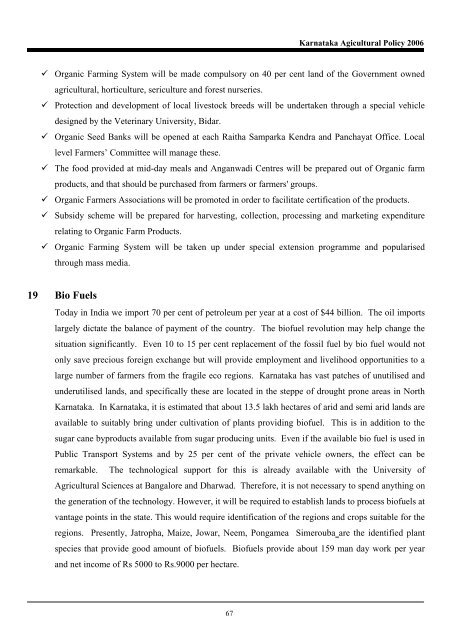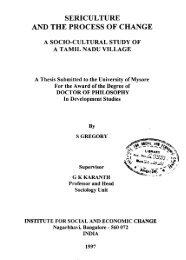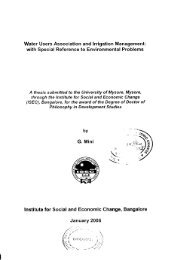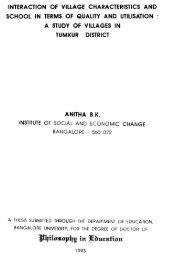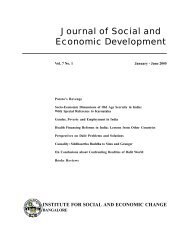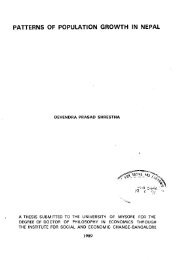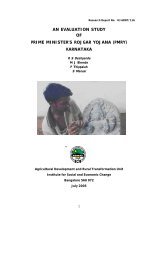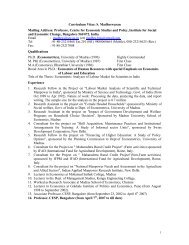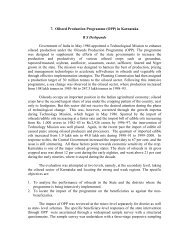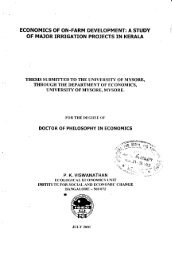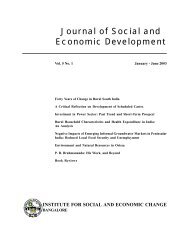Karnataka Agricultural Policy - Institute for Social and Economic ...
Karnataka Agricultural Policy - Institute for Social and Economic ...
Karnataka Agricultural Policy - Institute for Social and Economic ...
Create successful ePaper yourself
Turn your PDF publications into a flip-book with our unique Google optimized e-Paper software.
<strong>Karnataka</strong> Agicultural <strong>Policy</strong> 2006<br />
Organic Farming System will be made compulsory on 40 per cent l<strong>and</strong> of the Government owned<br />
agricultural, horticulture, sericulture <strong>and</strong> <strong>for</strong>est nurseries.<br />
Protection <strong>and</strong> development of local livestock breeds will be undertaken through a special vehicle<br />
designed by the Veterinary University, Bidar.<br />
Organic Seed Banks will be opened at each Raitha Samparka Kendra <strong>and</strong> Panchayat Office. Local<br />
level Farmers’ Committee will manage these.<br />
The food provided at mid-day meals <strong>and</strong> Anganwadi Centres will be prepared out of Organic farm<br />
products, <strong>and</strong> that should be purchased from farmers or farmers' groups.<br />
Organic Farmers Associations will be promoted in order to facilitate certification of the products.<br />
Subsidy scheme will be prepared <strong>for</strong> harvesting, collection, processing <strong>and</strong> marketing expenditure<br />
relating to Organic Farm Products.<br />
Organic Farming System will be taken up under special extension programme <strong>and</strong> popularised<br />
through mass media.<br />
19 Bio Fuels<br />
Today in India we import 70 per cent of petroleum per year at a cost of $44 billion. The oil imports<br />
largely dictate the balance of payment of the country. The biofuel revolution may help change the<br />
situation significantly. Even 10 to 15 per cent replacement of the fossil fuel by bio fuel would not<br />
only save precious <strong>for</strong>eign exchange but will provide employment <strong>and</strong> livelihood opportunities to a<br />
large number of farmers from the fragile eco regions. <strong>Karnataka</strong> has vast patches of unutilised <strong>and</strong><br />
underutilised l<strong>and</strong>s, <strong>and</strong> specifically these are located in the steppe of drought prone areas in North<br />
<strong>Karnataka</strong>. In <strong>Karnataka</strong>, it is estimated that about 13.5 lakh hectares of arid <strong>and</strong> semi arid l<strong>and</strong>s are<br />
available to suitably bring under cultivation of plants providing biofuel. This is in addition to the<br />
sugar cane byproducts available from sugar producing units. Even if the available bio fuel is used in<br />
Public Transport Systems <strong>and</strong> by 25 per cent of the private vehicle owners, the effect can be<br />
remarkable. The technological support <strong>for</strong> this is already available with the University of<br />
<strong>Agricultural</strong> Sciences at Bangalore <strong>and</strong> Dharwad. There<strong>for</strong>e, it is not necessary to spend anything on<br />
the generation of the technology. However, it will be required to establish l<strong>and</strong>s to process biofuels at<br />
vantage points in the state. This would require identification of the regions <strong>and</strong> crops suitable <strong>for</strong> the<br />
regions. Presently, Jatropha, Maize, Jowar, Neem, Pongamea Simerouba are the identified plant<br />
species that provide good amount of biofuels. Biofuels provide about 159 man day work per year<br />
<strong>and</strong> net income of Rs 5000 to Rs.9000 per hectare.<br />
67


